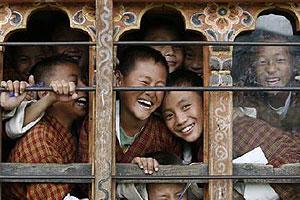
Bhutan's unique formula of using happiness to measure the development index may have captured the imagination of many countries but the government's priority should be to create basic conditions for experiencing happiness, says a leading scholar on Bhutan.
"Despite attempts to make Gross National Happiness (GNH) philosophically and econometrically tenable, the initiative is not without problems and criticisms. Most people argue that happiness is a state of the mind and an internal subjective experience," writes Karma Phuntsho's in his new book "The History of Bhutan", published by Random House India.
"What triggers the experience of happiness differs from person to person depending on their cultural background, individual interest and often on the point of comparison. Any attempt on the part of a state or government to provide, let alone impose, a uniform value or definition of happiness is futile," Phuntsho, who teaches Buddhism and Bhutan Studies in the Himalayan country and abroad, says.
The idea of happiness and wellbeing as key points of development has been a part of Bhutan's political psyche. It was pursued as a deliberate policy goal when former king Jigme Singye Wangchuck introduced GNH to define the official development paradigm for the country.
Apart from the objectives of development that seek to increase GDP on a national level and incomes at the household level, development in Bhutan encompasses the achievement of less quantifiable but highly qualitative objectives. GNH is centred on the belief that happiness is the ultimate desire of every individual, and by extension, the responsibility and purpose of the state is to create the necessary conditions that enable citizens to lead a good life.
Phuntsho argues that the state must create conducive conditions required for the experience of happiness.
"While many agree that GNH is a useful framework for guiding development and giving it a sense of direction, they argue that for a developing country like Bhutan, the government's priority must be in improving the basic conditions for happiness rather than excessively talking about happiness itself.
"These critics point out that even today over 20 per cent of the population live under the national poverty line, governance and public services are far from efficient, youth delinquency and crimes are rising while the cultural heritage is eroding and the economy is ever more precarious with too much dependence on imported goods. At such times, GNH dangerously veers to the point of being an ideological distraction from the real issues and problems."
Read original article at http://www.financialexpress.com/news/of-bhutan-happiness-and-development-index/1107032